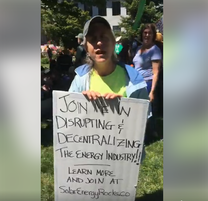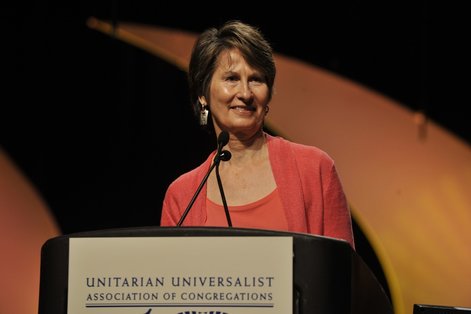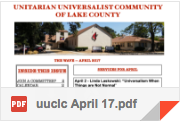
a sermon by Carol Cole-Lewis
My mother, my father and I were sitting down one evening after dinner not that many years ago enjoying a nice cup of tea after one of my mother’s fantastic Italian feasts. The discussion wandered around to the Prius I had just purchased. “Why do you own one of those things?” my father asked (my father, as many of you know, was quite a conservative kinda’ guy....). I can’t exactly remember my initial reply, but then I asked him a question: “If you could buy any car you wanted, which car would it be?” He thought a few moments, then replied, “a Humvee”. “But why, Dad? You live in a fairly suburban area, and the gas mileage of that huge, originally military vehicle is measured in single digits.” He looked at me straight in the eye, squared his shoulders and proudly declared “Because I can.”
Because I can.
Americans have been blessed over the last two hundred or so years. We came from all parts of the world to seek a place where lives could be lived in peace and freedom, and wealth seemed to flow out of the very cracks of the rich fertile soils that covered our lands. Our mouths were quenched by the clean, cool pure waters of our rivers and streams. Our lungs were filled with the sweet air laced with the scents of thousands of varieties of wild flowers. Our eyes feasted on herds upon herds of deer, elk, buffalo and countless other species of fur or fowl that graced the seemingly unlimited expanse of plains and mountains. Ah, The American Dream!
“Actually, the phrase “American Dream” was invented during the Great Depression. It comes from a popular 1931 book by the historian James Truslow Adams, who defined it as “that dream of a land in which life should be better and richer and fuller for everyone”.
In the decades that followed, the dream for many Americans became a reality. Thanks to rapid, widely shared economic growth, nearly all children grew up to achieve the most basic definition of a better life – earning more money and enjoying higher living standards than their parents had.”1
Now, I’m all in favor of living in comfort. I like a warm house and a cozy fire with a cat on my lap as much as any other cat lover out there. However, no matter what your vision is of the American Dream, the problems start to arise when we forget what we were trying to achieve by living the American Dream in the first place.
What do YOU think What do YOU really want to achieve in your life? I’m going to make the assumption that what everyone really REALLY wants in the deepest part of their being is to be
HAPPY .
We want happiness for ourselves, our children, our friends, our loved ones. Indeed, if everyone WAS happy, would there ever be a reason for violence or war? I don’t think you can be fearful or angry at the same time you’re happy, can you?
So, as human beings, we seek happiness and flee pain.
Think back to your childhood. I don’t know if your mother did what mine did, but I can remember in the summertime, if my sister and I were really, really good, she would give us a quarter to get ice cream from Freddy the Good Humor Ice Cream salesman that used to drive down our street. That ice cream sure tasted good, though it was gone in a flash, and the happiness that it brought me melted away with it. There had to be a better, more permanent way to happiness than this.
And I suppose it was a good thing I asked myself that question. Tim Kasser and Richard Ryan, in their 1996 study “Further Examining the American Dream: Differential Correlates of Intrinsic and Extrinsic Goals”2 suggested that LOWER wellbeing is associated with individuals having goals focused on external rewards or praise, in comparison to those people whose goals were more internal and not based on the approval of others. People who have aspirations for financial success, an appealing appearance, and social recognition actually were associated with “lower vitality and self-actualization” and had more physical symptoms. Conversely, an individual seeking internal self-acceptance, and an ability to embrace community showed higher states of wellbeing and less distress.
Susan Linn is the director of the Campaign for a CommercialFree Childhood and is the author of “The Case for Make Believe: Saving Play in a Commercialized World.” She says in a recent New York Times Article that “Children need opportunities to find joy and meaning in what can’t be bought, like friendship, creativity, love and the natural world.”3
Consuming more is not the answer to happiness. Yet, we consume because it makes us feel good. A few years ago I was a part of a team implementing a Community Transformation Grant in Lake County. This grant was awarded to improve the health of Lake County residents. One of the focus areas of the grant was smoking cessation. Through the course of working on various brochures and programs designed to address this focus area, I learned something very important about the habit of smoking: people smoke because there is a real benefit for them to do so – it meets a deep generally unconscious need that is so overpowering that even after they watch a loved one suffer a horrible death due to lung cancer, they continue to puff away. The only way one can truly stop smoking is when you can fill that deep void that smoking fills with something else something more beneficial. No “stop smoking billboards” or laws prohibiting smoking will have an effect on the committed smoker.
Like a smoker, we, too, are addicted. We are addicted as a culture to oil and coal. The problem is this issue is not just one person, or one community it’s the entire human race (even those who don’t yet have much, still lust for the riches of the west)
Why is it so difficult for us to take care of our bodies, our planet?? Is it because of a deep spiritual crisis a lack of understanding of who we truly are and how we look for God and/or happiness? A deep self hatred and loathing that causes us to want to destroy? We need to cure the root of this problem but this may not be possible until we hit rock bottom. We ALL have to find a way to fill the void and find happiness true happiness or our planet is doomed.
Spiritual teachings and teachers have a good deal to say about our inner void and how to find this true happiness.
In “The Art of Happiness”, the Dalai Lama gives us some clues. He says, “we need to learn how to want what we have NOT to have what we want in order to get steady and stable Happiness.”4
Eckhart Tolle, who in 2011 was listed by Watkins Review as the most spiritually influential person in the world, says “The pollution of the planet is only an outward reflection of an inner psychic pollution: millions of unconscious individuals not taking responsibility for their inner space.”5
The Reverend Forrest Church was a minister of a very large Unitarian Universalist church in New York. When he learned he had cancer, Reverend Church decided to document his trip through this part of his life by writing the book “Love and Death: My Journey Through the Valley of the Shadow”. Forrest found the real answer to living a joyful and happy life was based in three simple things. These three thing became his mantra: Want what you have. Do what you can. Be who you are.”
Michael Singer, the author of the highly successful book, “The Untethered Soul” has an interesting view on life and happiness. He says:
“The highest spiritual path is life itself. If you know how to live daily life, it all becomes a liberating experience. But first you have to approach life properly, or it can be very confusing. To begin with, you have to realize that you really only have one choice in this life, and it’s not about your career, whom you want to marry, or whether you want to seek God. People tend to burden themselves with so many choices. But, in the end, you can throw it all away and just make one basic, underlying decision: Do you want to be happy, or do you not want to be happy? It’s really that simple. Once you make that choice, your path through life becomes totally clear.”
Most people don’t dare give themselves that choice because they think it’s not under their control. Someone might say, “Well, of course I want to be happy but my wife left me.” In other words, they want to be happy, but not if their wife leaves them. But that wasn’t the question. The question was, very simply, “Do you want to be happy or not?” If you keep it that simple, you will see that it really is under your control. It’s just that you have a deepseated set of preferences that get in the way.” 6
Spiritual teachers also have a thing or two to directly say about our collective approach to life on our planet. As many of you know, I tend to be more Christian in my Unitarian faith than my husband. My hero, Father Richard Rohr, has allowed me to reclaim my Christian heritage and has shown me the deeper meanings of the Bible and how it is entirely congruent with my current spiritual path. This excerpt is from a recent daily meditation of his I subscribe to:
Christ is the Archetype and Model for the rest of creation as Scripture clearly teaches. Yet Christians have instead focused on proving that Jesus is “God,” which felt necessary to put our group out in front and to solidify our own ranks. We were more eager to make Jesus the “top” than to make him the “whole,” and thus we ended up with a religion largely concerned with exclusion.
If the Eternal Christ is forgotten or ignored, Jesus becomes far too small, a mere local “god” instead of a universal principle. Many Christians still see the universe as incoherent, without inherent sacredness, a center, direction, or purpose beyond personal survival itself. Many Christians focus on “saving their own soul” with little care for the world as a whole. Massive disbelief is the result. It is hard to feel privately holy or good when the universe is neither holy nor good.
No wonder science and reason have now taken over as “the major explainers” of meaning for much of the world. Jesus was indeed a deep and life changing encounter for some people, but the official Church often showed little evidence of his universal love. Christians brought Jesus to the “New World,” but hardly ever Christ, as we see from our treatment of indigenous peoples and the earth. Most slave owners and proponents of apartheid fully identified as “Christians.” Lots of mop up work is required of Christianity for the rest of history, after we dragged poor Jesus through our mud.
We failed to offer the world universal meaning, and now we live in a postmodern and largely postChristian world that denies any “big story line” or purpose to existence. So instead of universal hope, we live inside of cosmic cynicism and we retreat into small identity politics. This is a major crisis and loss of inherent dignity to the whole human project. All the extravagances, technologies, and entertainments will never be able to fill such a foundational hole in the human psyche. In other words, the world—even most of the Christian world—has yet to hear the Gospel!
A few months ago, Denise Rushing and I were enjoying the beauty of our Dancing Treepeople Farm. We were sitting around a fire pit which we use for spiritual ritual and for the routine necessity of burning broken branches that fall from our walnut trees as we started to discuss climate change and paganism. She shared with me profound thoughts from Thomas Berry, Matthew Fox, Brian Swimme and others. One particular viewpoint she shared hit me as squarely between the eyes as enlightenment struck the Apostle Paul on the road to Damascus. I’m going to paraphrase it here, but I think I’ve captured the essence of what she told me:
One of the reasons our planet is in the shape it is in is because the dominant and most affluent countries adhere to a worldview that is based on a Fundamental Christianity. When you believe this way, you are taught you are “In” the world and not “Of” it. You are told your treasure is in heaven and not on earth. The focus is on salvation away from the evils of this world. Is it any surprise that a culture that believes this way could never see creation as sacred, and therefore would NOT see dealing with climate change as a priority.
I attended the People’s Climate March in Sacramento yesterday. I do love going to these marches. I love lending my body and voice to thousands of other like minded people as we demonstrate our dissent towards this administration’s agenda of attacking climate action and promoting fossil fuel development. And this type of protest is important, as I believe large scale protests like these can have an affect on the hearts and minds of our elected officials as they seek to keep their jobs by serving the citizens they are sworn to represent.
Yes, Governments and Corporations may be guilty of atrocious environmental calamities that have damaged the lives of many people (and especially the poor who usually bear the brunt of toxic fallout). And, with third world nations striving to compete with the consumption of the west, they must turn to cheaper coal and other polluting fuels as they seek their version of the “American Dream”.
Ultimately, though, corporations and governments won’t change until the people who are their customers and citizens change WE Change Ourselves. We must find a more effective way than consumption to fill the void of existence we must make the choice to be happy. We must make the choice to recognize and value the importance of right relationship with each other. We must choose to see our God as One with, and not separate from, Creation. When we deeply know these things and are truly happy, we will naturally stop consuming our precious planet, and the words “climate change” will take on an entirely new and hopeful meaning.
----------------
1 https://www.nytimes.com/2016/12/08/opinion/theamericandreamquantifiedatlast.html
2https://www.researchgate.net/publication/246276634_Further_Examining_the_American_Dream_Differen tial_Correlates_of_Intrinsic_and_Extrinsic_Goals
3 https://www.nytimes.com/roomfordebate/2012/12/20/howshouldchildrenlearntoshop/consumptionisth elastthingchildrenneedtolearn
4https://www.goodreads.com/work/quotes/1651617theartofhappinessahandbookforliving
5 https://andreastevens.wordpress.com/2014/07/20/innerclimatechangebyetolle/
6 http://untetheredsoul.com/



 RSS Feed
RSS Feed
